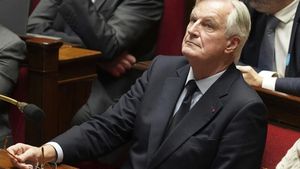On January 20, 2025, President Donald Trump initiated his second term by ordering a sweeping 90-day freeze on almost all U.S. foreign aid, impacting millions worldwide and raising alarms over global health stability. This directive made exemptions solely for military funding to Egypt and Israel and emergency food aid, resulting in immediate disruptions for health initiatives reliant on U.S. support.
Among the most significantly affected programs was the President’s Emergency Plan for AIDS Relief (PEPFAR), established under former President George W. Bush. Since its inception, PEPFAR has saved more than 25 million lives, but the recent freeze forced its operations to cancel appointments and turn away patients. Reports indicate within days, two-thirds of the staff under the President’s Malaria Initiative lost their jobs, and humanitarian assistance efforts providing clean water and cholera treatment were halted across regions like Gaza, Sudan, and Syria.
Low-income countries faced dire consequences as oxygen supplies, disease control programs, and other life-saving services ground to a halt. An unsettling case unfolded at the Mae La refugee camp on the Thai-Myanmar border, where 60 patients suffering from varying ailments were sent home, deprived of necessary care due to the junction of abrupt policy changes.
One patient with tuberculosis lamented, "It feels like one easy decision by the U.S. president is quietly killing so many lives," according to the New York Times. The uncertainty catalyzed by Trump’s administration even prompted Secretary of State Marco Rubio to issue an emergency waiver for HIV treatments, though the vagueness of the waiver left many humanitarian groups unsure of their operational statuses and led to widespread disruptions across health service delivery.
Despite former President Trump’s claims of cutting waste and misalignment of aid with American values, experts like Dr. Jennifer Furin from Harvard Medical School perceive the freeze as highly detrimental. “I’ve been an infectious disease doctor for 30 years, and I’ve never seen anything scare me as much as this,” she stated. The cessation of funding raises fears about the emergence of drug-resistant diseases, as people stop taking antiretroviral HIV medications.
At the center of the crisis are various health services previously supported by U.S. foreign aid, touching nearly all corners of the globe—from Zambian hospitals stalling distributions of life-saving childhood diarrhea treatments to reports of rising HIV prevalence rates among vulnerable populations. Experts warn abruptly cutting these funds without built-in transition periods could devolve health successes achieved since the early 2000s.
Statistics show past interventions, such as the Global Fund’s withdrawal from Romania, resulted in catastrophic spikes of HIV among injecting drug users and other marginalized groups. The epidemic of instability can be seen across infamously dangerous terrestrial corridors as programs for end-user healthcare cease, risking millions who continue to struggle with disease. What has unfolded worldwide is not merely budgetary adjustments; it is health jeopardization.
The Trump administration’s rationale for this aid freeze, professing to align foreign assistance closely with American interests and governance principles, has blurred the thorough review process initially intended. A senior USAID official quipped, “A chaotic, unexplained, and abrupt pause… has left all our partners around the world high and dry.”
Critics assert this abrupt action not only threatens the health and well-being of millions but also relinquishes U.S. global leadership to adversaries seeking to fill vacuums left by reduced American support. Observers noted, "There’s nothing left untouched" within humanitarian contexts as lifelines to vulnerable populations flicker out.
Yet, the uncertainty stemming from the health sector's sudden turbulence doesn’t have to end this way. Before the freeze, many low and middle-income nations were incrementally transitioning to self-sustaining health programs with lower aid dependence. Nevertheless, the phrase “gradually” from initiators seems ironic when posed against the immediacy of aid suspension.
Going forward, as the freeze remains intact, health care workers lose jobs, clinics close, and patients are left without services. With over 222,000 individuals depending daily on PEPFAR’s services, estimates suggest the halt could lead to approximately 136,000 newborns acquiring HIV due to treatment disruptions. This grim forecast presents only the most immediate fallout of the current policy wave.
The need is pressing for strategic guidance restoring the global health programs previously cradled under U.S. funding. Without those checks, there are murmurs of renewed chaos on the horizon. Each day without intervention raises the specter of disease, underscoring how quickly gains can slip away.
Making amends may entail lessons learned from history; the importance of maintaining connections, constructing resilient systems, and providing uninterrupted health services cannot be overstated. U.S. leadership must respond communications and behavior to avoid leaving the most vulnerable populations to suffer the consequences of policy miscalculations.



